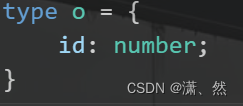typescript 中 infer 用法
2024-01-02 15:57:52
infer
介绍
-
infer 一般在 extends 子语句中,infer 会引入一个待推断的类型变量 (如
infer R) R可以是任意单词字母 -
这个推断的类型变量可以在有条件类型的 true 分支中被引用
-
允许出现多个同类型变量的 infer。
基本示例
type ParamType<T> = T extends (arg: infer R) => any ? R : T;
type s = ParamType<string>;
type n = ParamType<(id: number) => void>;
type o = ParamType<{ id: number }>;



在这个条件语句 T extends (arg: infer R) => any ? R : T; 中,infer R 表示待推断的函数参数。
整句表示为:如果 T 能赋值给 (arg: infer R) => any,则结果是 (arg: infer R) => any 类型中的参数 R,否则返回为 T。
内置类型
提取函数类型的返回值类型
type ReturnType<T> = T extends (...args: any[]) => infer R ? R : any;
// type n = number
type n = ReturnType<() => number>;
// type s = string
type s = ReturnType<() => string>;
在协变位置上,同一个类型变量的多个候选类型会被推断为联合类型
type Foo<T> = T extends { a: infer U, b: infer U } ? U : never;
type T10 = Foo<{ a: string, b: string }>; // string
type T11 = Foo<{ a: string, b: number }>; // string | number
在抗变位置上,同一个类型变量的多个候选类型会被推断为交叉类型
type Bar<T> = T extends { a: (x: infer U) => void, b: (x: infer U) => void } ? U : never;
type T20 = Bar<{ a: (x: string) => void, b: (x: string) => void }>; // string
type T21 = Bar<{ a: (x: string) => void, b: (x: number) => void }>; // string & number
infer 类型参数上的 extends 约束
返回元组类型的第一个元素如果它类似 string 类型的话
type FirstIfString<T> =
T extends [infer S, ...unknown[]]
? S extends string ? S : never
: never;
// string
type A = FirstIfString<[string, number, number]>;
// "hello"
type B = FirstIfString<["hello", number, number]>;
// "hello" | "world"
type C = FirstIfString<["hello" | "world", boolean]>;
// never
type D = FirstIfString<[boolean, number, string]>;
文章来源:https://blog.csdn.net/weixin_43512977/article/details/135228553
本文来自互联网用户投稿,该文观点仅代表作者本人,不代表本站立场。本站仅提供信息存储空间服务,不拥有所有权,不承担相关法律责任。 如若内容造成侵权/违法违规/事实不符,请联系我的编程经验分享网邮箱:veading@qq.com进行投诉反馈,一经查实,立即删除!
本文来自互联网用户投稿,该文观点仅代表作者本人,不代表本站立场。本站仅提供信息存储空间服务,不拥有所有权,不承担相关法律责任。 如若内容造成侵权/违法违规/事实不符,请联系我的编程经验分享网邮箱:veading@qq.com进行投诉反馈,一经查实,立即删除!